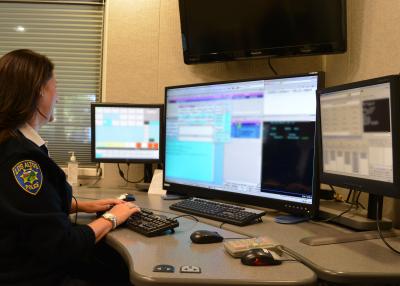9-1-1 Communications
The Los Altos Police Department Communications Center serves as the Public Safety Answering Point (PSAP) for the City of Los Altos. Emergency and non-emergency police, fire and medical calls are answered 24-hours a day. The Communications Center has the responsibility of prioritizing and dispatching calls for service, monitoring and tracking field units, and ensuring the safety of officers in the field.
Contact Us
- Non-emergency phone calls can be directed to (650) 947-2770, this line is answered 24 hours/7 days per week.
- If the situation is an immediate threat to life or property, medical emergency, fire or a crime in progress, always dial 9-1-1.
- An alternative to dialing 9-1-1 would be (650) 947-2779. This number is answered by a 9-1-1 call taker.
- Dialing 9-1-1 in an emergency is still the preferred way to request help, and the public is reminded to “Call if you can. Text if you can’t.”
- Text to 9-1-1 is intended primarily for use in three emergency scenarios:
- For an individual who is deaf, hard-of-hearing or has a speech disability.
- For someone who is in a situation where it is not safe to place a voice call to 9-1-1.
- A medical emergency that renders the person incapable of speech
- ONLY text 9-1-1 in an emergency. Prank-texters can be identified and possibly prosecuted according to local laws/regulations.
9-1-1 Education
9-1-1 is the number to call for help in a police, fire or medical emergency, and is dedicated to calls for emergency aid and crimes in progress such as imminent threat to life, bodily injury, or major property damage or loss. A home burglary in progress, person with a gun, traffic accident, fires or calls for paramedic services are all examples of emergencies. If you are unsure if something is an emergency, call 9-1-1.
When Reporting an Emergency
- Give the location of the emergency. Locations must always be verified.
- Remain calm and speak slowly and clearly while explaining the type of emergency you are reporting.
- Stay on the line while the Communications Officer processes your call. You may need to provide additional information or receive instructions.
- The Communications Officer will request your name and location. You do not have to identify yourself when you are reporting a crime, unless you are the victim of the crime.
Tips for Helping Us Help You
We understand that having to call 9-1-1 for any reason can be a confusing and sometimes frightening experience. Utilize the following tips before and during your call that will insure the call is processed as quickly as possible:
- Take a brief moment before you call to think about what you are reporting. If the crime is not occurring at the time of call, gather as much information about the incident as possible.
- If the crime is occurring when you call, you will be asked specific questions by the Communications Officer, essentially becoming the eyes and ears for police officers who will be responding to the scene.
- If you are a victim of a violent, in-progress crime such as domestic violence or assault, for example, the call-taker speaking with you can also dispatch the officers to your location, simultaneously. It can often seem like the call-taker is delaying the dispatch of your call by asking you additional questions, when in fact the opposite is true.

